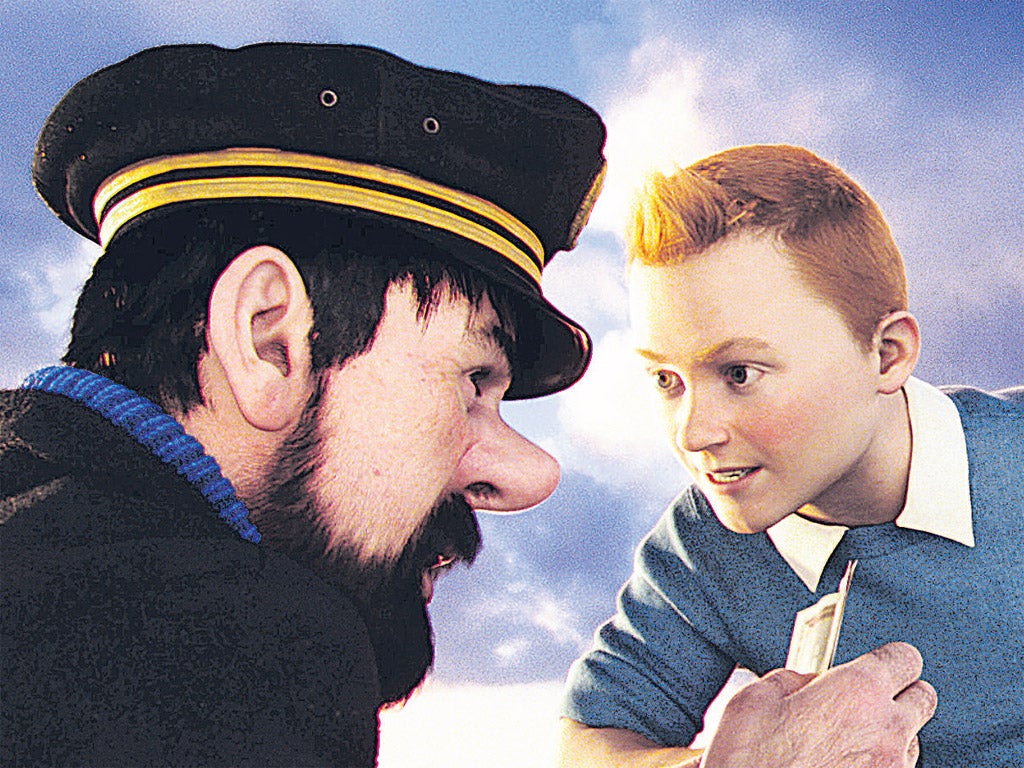The Adventures Of Tintin: The Secret Of The Unicorn(PG)
Starring: Jamie Bell, Andy Serkis, Daniel Craig

Steven Spielberg has been trying to bring Tintin to the screen for nearly 30 years. The surprise is that a film that apparently means so much to him should feel so impersonal. As a ripping yarn, The Secret of the Unicorn passes muster. The set-pieces are choreographed with the flair for action that comes as second nature to the director. Whether a pickpocket running amok in a Brussels square or Tintin and Captain Haddock aboard a lifeboat, fighting off a plane, or Snowy (Tintin's dog) leaping on top of vehicles and under the udders of cattle to rescue his master, the film is full of colour and drama. In the rare moments when the pace flags, the booming John Williams music is always there to galvanise the storytelling. What this Tintin lacks, though, is a human dimension.
The "performance capture" technique used by Spielberg leaves him stranded in a netherworld between live action and animation. The faces of the actors (Jamie Bell as Tintin, Andy Serkis as Captain Haddock, Simon Pegg and Nick Frost as Thomson and Thompson) look uncannily like the drawings kids of many different generations will remember from the Hergé cartoons. The drawback is that these faces are as inexpressive as masks. In spite of the excellence of much of the voice-work (especially the bellowing Serkis as a Glaswegian Haddock), you will struggle to spot nuance or emotional depth in the performances. There is not a single scene in the entire movie that's as powerful or affecting as (say) the scenes in Spielberg's adaptation of J G Ballard's Empire of the Sun in which we see the intrepid kid (Christian Bale) abandoned and trying to stay alive in wartime Shanghai.
There is a dispiriting sense that Spielberg and his team are playing it safe. Their Tintin is stripped of ideological baggage. 80 years ago, Hergé's first Tintin adventures dispatched the tufty-headed little reporter/detective to the Land of the Soviets and to the Congo. Those are not destinations that the film-makers were keen to explore. They neither wanted to pit Tintin against the Bolsheviks or to revive memories of European colonial behaviour in Africa. Instead, the screenplay draws from three different (but less contentious) Tintin adventures: The Crab with the Golden Claws, The Secret of the Unicorn and Red Rackham's Treasure.
This Tintin also has a very British feel. The screenplay, by Scottish writer Steven Moffat, and Brits Edgar Wright and Joe Cornish, has a nice line in dry understatement. Early on, when a man is shot on Tintin's doorstep, his landlady clucks disapprovingly, "not again!" The writers relish squeezing as much humour out of Haddock's love of whisky as they can. (Inevitably, he seems at his most deranged when he is actually sober.) Many moments evoke memories of old Hitchcock films that likewise combined rip-roaring action with comical characterisation. Thomson and Thompson are likeable buffoons in the spirit of Charters and Caldicott, the cricket-loving eccentrics who cut such incongruous figures in Hitchcock's The Lady Vanishes. Daniel Craig's Sakharine is the type of villain you expect to find in an old John Buchan book.
If Spielberg is borrowing freely from Hitchcock as well as Hergé, he is looking to his own back catalogue too. The director first tried to make contact with Hergé in the early 1980s (the Tintin author died in 1983) – his Raiders of the Lost Ark period. He clearly saw Tintin as a junior counterpart to Harrison Ford's Indiana Jones. One key difference between Jones and Tintin is that the former has a romantic life or, at least, the possibility of one. Actresses such as Karen Allen and Kate Capshaw are along for the ride. By contrast, the only companionship Tintin has is that of his dog and of Captain Haddock. Tintin is a curiously sexless character. His age is impossible to place. He is a reporter, which suggests he must be an adult, but he looks like an adolescent who hasn't yet reached the age where he needs to shave. The lack of a romantic subplot is a problem in a film in which the protagonists (thanks to the performance-capture technology) already seem so inexpressive. In Hergé's cartoons, Snowy is given a voice. Here, the dog is agile and ingenious, but only gets to whimper.
Earlier this year, Mars Needs Moms, a 3D film co-produced by the Hollywood visionary and pioneer of performance capture Robert Zemeckis, was a failure. Tintin, therefore, has even more riding on it. The hope is to establish Hergé's creation as a full-blown movie franchise. Peter Jackson (who produced this instalment) is due to direct the sequel; he and Spielberg may collaborate on a third film. If the films are successful, they will re-establish performance capture as a viable technique.
The first episode is effective enough in delivering a fairground ride-style adventure. It's an old-fashioned family movie with an appeal likely to stretch across generations. One of its pleasures is how gingerly it skips between genres, combining elements of swashbucklers (Captain Haddock's ancestor's epic sword fight), fantasy adventures along The Thief of Bagdad lines, spy movies and slapstick comedy. The formal ingenuity is often breathtaking. This, though, is not a movie that tugs at the emotions in any way. Compared to Spielberg's more personal efforts, it can't help but feel machine-made and even a little perfunctory.
Subscribe to Independent Premium to bookmark this article
Want to bookmark your favourite articles and stories to read or reference later? Start your Independent Premium subscription today.

Join our commenting forum
Join thought-provoking conversations, follow other Independent readers and see their replies